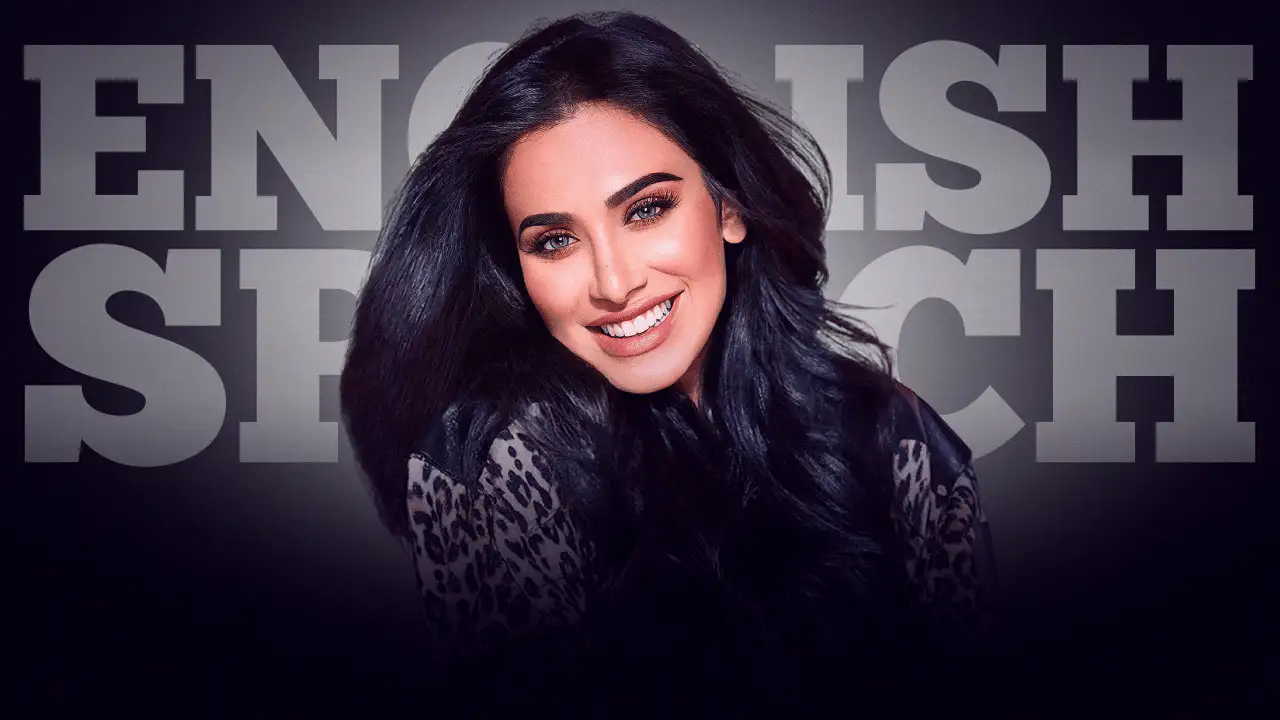Huda Kattan’s inspiring speech at #BoFVOICES 2018 explores the journey of embracing individuality and transforming it into a strength. As the founder of Huda Beauty, she shares her story of overcoming challenges, redefining “weirdness,” and creating one of the fastest-growing beauty brands in the world. Her message highlights the importance of self-acceptance, creativity, and pushing boundaries to achieve success.
Donwload available for Premium Subscribers
PDF Full Transcript
Explore every word with our concise PDF transcripts.
Audio Version
Immerse in speeches with clear, downloadable audios.
English Lesson
Enhance English skills with interactive speech lessons.
⚬ Free 30-day trial

”Embrace your weird; it's your genius.
Transcript
Hi everyone. Thank you so much to Imran and to Business and Fashion for inviting me here to speak today. It truly is such an honor to be in such incredible company. All of us here have many things in common, but probably the most outstanding is that we are unafraid of being different. And I want to get a little more specific about something a lot of people don’t talk about. Probably because they feel a little uncomfortable about it, but everyone has a degree of it whether they like to admit it or not. And that is being weird.
Has anyone ever been told that they were strange, awkward, different, or weird? How did that feel? I think for most people it feels horrible. I remember the first time someone called me weird. It was the second grade. The girl’s name was Laura. Not gonna say her last name. And she looked at me with a face of disgust. Not for any real reason. We were all playing in the playground. I was new to the school. But she just stared at me for a good few minutes and said with such strong conviction, “Huda, you’re weird.” That’s exactly how she said it. We’re friends now. To make matters worse, a few kids jumped in and said, “Huda, you’re kind of a weirdo. Why are you so different?” It was a shock to my system. I felt like an alien. I looked at myself and said, “I don’t think I’m weird. I actually think I’m pretty cool. But if so many kids are calling me weird, I must be so weird.” I mean, that’s where you go for information. Seven-year-olds were pretty much all I got my information from. As a kid, as silly as it sounds, they were who they defined who I believed I was.
And to be honest, I felt different from everyone else. I was darker, hairier, my hair was unruly, my parents would sometimes speak loudly in Arabic across the halls. It was so embarrassing. I was one of the only brown kids in an all-white Baptist city just an hour outside of Nashville. My family was a Muslim immigrant family with very little money. When my dad could, he got a loan and moved us to a part of town so we could go to a safe school. But we knew we didn’t fit in. It showed, not only from our appearance and our culture, but from the handed-down clothing we wore to the two-tone duct-taped cars we drove. And to be honest, my personality may have been totally off the wall. I mean, I loved to talk. I loved to sing. I loved to dance. I was so animated and excited about everything. I loved being completely silly, making fun of myself, and I had a huge obsession with the arts. I was so different that even some of my teachers complained that although I was a gifted artist, I was awkward and talked way too much.
So yeah, I may have been pretty weird compared to everyone else. But we were just kids. Did we have to be the same to have fun together? I hated being such an outsider. Why couldn’t I just be like everyone else? So I told myself, “Huda, don’t be Huda. Be like everyone else. Watch them. Stand like them. Talk like them. Think like them. But don’t you dare for one minute be your weird, different self.” So I stopped using my first name because no one could pronounce it anyways. People would call me Hoda, Honda, Hooters. Not sure how some of those names are similar to Huda, but I was done with it. I ended up going by my middle name, Heidi, and attempted to blend in, and boy did I. It worked so well I even became really popular. I mean, I hung out with the cool girls. No one remembered that weird little Huda from the second grade. In fact, I didn’t either.
I spent the next few years of my life trying to pretend like I was everyone else. The reality is you always become your environment, but what happens when your environment takes over and you forget who you are? And that’s where I was. Lost, but perfectly blended. To some degree, I was happy because I finally fit in. I did everything I was supposed to. I got good grades, left the arts completely, focused on maths, went to a great university, was heavily involved in student organizations, focused on wanting to be a professor of statistics, built my CV impeccably, then my first job out of university, I was fired. My boss said I didn’t fit the part. I didn’t belong there. I don’t fit the part? What did I do wrong? I removed the Huda in me. I tried to be like everyone else and I still didn’t belong. I had an identity crisis. For the first time, after doing everything I was supposed to, and finally being pushed to my limit, I felt pushed out. And I had no choice but to accept who I was. I didn’t want to pretend anymore. I wanted to be fully me, totally and utterly weird.
But I think we’ve all been taught wrong about what it means to be weird. A quick search on Google for the world’s weirdest people and results showing people fitting entire Coke cans in their mouths and men who can hold and who can withstand below zero temperatures will pull up. If you ask me, that’s not weird, that’s talent. Society has asked us to be the same because different is not good. Being different challenges norms. But different is brilliant. It’s how society is pushed to revolutionize and how it flourishes. When I finally accepted what I… when I finally accepted that I was different, what happened? Did people hate me? Did they want to avoid me? More importantly, how did I feel about myself? One word, freedom. The crazy part about accepting yourself for all that you are is that the conviction of not, the conviction of not caring what people think allows them to accept you in return.
When society denies you, your peers, your teachers, everyone around you because they can’t understand you, does that mean you are any less of a human? That you don’t deserve happiness, wholeness or success? If you ask me, the only people who, the only people who actually feel happiness, wholeness and success are the people who embrace how weird they are. Some of the greatest people who influence society were the weirdest and some of the people I admire the most. Albert Einstein, Frida Kahlo, Michael Jackson, Steve Jobs, Gabrielle Chanel, Jeff Bezos and Imran Ahmed. I hope you’re not mad at me. Anyone that has had a profound impact on the world had to be some degree of weird. The only thing they did different was embrace it. In fact, that’s what I like to call genius. Knowing and appreciating how fundamentally different you are and knowing that that is why you are here.
When I finally started thinking about the word weird differently, when I became unapologetically myself, the weird, the awkward, the passionate Huda, our brand changed. More importantly, I changed. It wasn’t as easy at first. People looked at me strange when I would say things like, “Can we do a vlog on YouTube? Me trying Vagisil, milk of magnesium and KY jelly as primer because I heard they’re really good.” They are really good. People thought I was crazy but I started to like it. I showed up to meetings in my animal printed face mask, work-a-tour gowns and fuzzy slippers and published numerous very embarrassing videos. But I also pushed our products and the industry further. We became limitless and were not chained to the beliefs of society. And slowly the impact was so profound that our brand didn’t blossom, it boomed. In fact, since launching Color Cosmetics in 2016, in less than three years, our brand has become one of the fastest growing beauty brands in the world. With each and every one of our products becoming top sellers in their respective categories and some becoming number one products globally. We were competing against conglomerates with billions of dollars with no marketing budget, less than a hundred people in our headquarters and everyone in the industry telling us we didn’t have a chance. How did we not only compete but dominate with such little resources? We accepted our weirdness, our crazy ideas, our need to push the industry to build something and to not only embrace criticism but welcome it.
But what happens when you expect your weirdness? You allow others to do the same. My team is full of a bunch of weirdos. By that I mean people who have learned to embrace their weird aka genius. I tell my team this, every once in a while you’re going to get a weird, crazy, insane idea. In fact, it’s going to be so outlandish that you will immediately feel uncomfortable and probably want to push that idea far, far away. But that is your genius. Go there, live there, be comfortable there in that crazy space to the point that you begin to navigate through it and can share those ideas. No matter how insanely awkward and crazy they are. Today I teach my daughter that being weird is a good thing. When someone calls her weird she says thank you because she’s already embracing her genius.
I want to leave you guys with one thought. What if we didn’t accept our inner weirdo? What if Einstein kept his thoughts to himself? What if Michael Jackson danced like everyone else? What if Frida Kahlo never painted her pain away? And what if Gabrielle Chanel reformed to society? Being weird, being different, embracing it, owning it, that’s your genius and that’s the only way to leave your mark on the world. Thank you.






